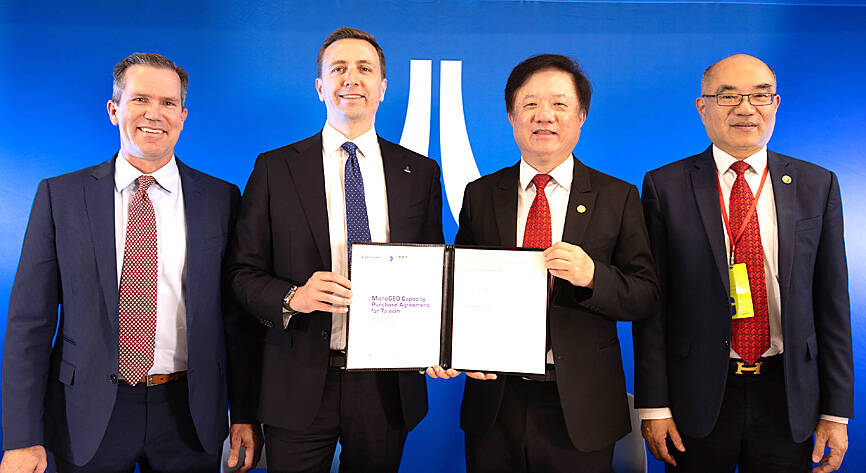Chunghwa Telecom Co yesterday said it has signed a strategic deal with Astranis Space Technologies Corp, a California-based satellite start-up, to develop Taiwan’s first dedicated compact geostationary orbit (MicroGEO) satellite.
The MicroGEO satellite, with features such as rapid deployment, high performance and exceptional reliability, is expected to significantly expand satellite capacity over Taiwan, Chunghwa Telecom said in a statement.
The satellite is scheduled to be launched at the end of this year with full-bandwidth services available as early as next year, it said, adding that it would be the first communications satellite exclusively dedicated to Taiwan.

Photo courtesy of Chunghwa Telecom Co
Astranis specializes in agile, flexible and MicroGEO satellite development, it said.
The partnership would complement the telecom’s multi-orbit satellite architecture, which includes in-orbit ST-2 GEO satellites, OneWeb’s low Earth orbit satellites and Luxembourg-based SES’ medium Earth orbit satellites, Chunghwa Telecom said.
The cooperation with Astranis is expected to improve Taiwan’s “sky, land, sea and air” network and advance the nation’s non-terrestrial network strategy, Chunghwa Telecom said.
As a leading and trusted communications service provider in Taiwan, Chunghwa Telecom has expanded its satellite initiatives in the past few years, company chairman Alex Chien (簡志誠) said in the statement.
“Astranis’ MicroGEO solution introduces vital flexibility and resilience to our satellite strategy,” Chien said. “This collaboration enables us to build a dedicated, secure digital infrastructure for Taiwan — one that can serve as a critical real-time backup against natural disasters, submarine cable disruptions and evolving global uncertainties.”
Astranis chief executive officer John Gedmark said that the company’s founding vision about a decade ago was to provide dedicated satellite capacity where it is most needed to ensure secure and independent communications.
With Chunghwa Telecom committed to building a globally connected, always-on digital resilience network, “we are honored to partner with Chunghwa Telecom to enhance the resilience of Taiwan’s critical communications infrastructure,” Gedmark said.

Taiwanese can file complaints with the Tourism Administration to report travel agencies if their activities caused termination of a person’s citizenship, Mainland Affairs Council Minister Chiu Chui-cheng (邱垂正) said yesterday, after a podcaster highlighted a case in which a person’s citizenship was canceled for receiving a single-use Chinese passport to enter Russia. The council is aware of incidents in which people who signed up through Chinese travel agencies for tours of Russia were told they could obtain Russian visas and fast-track border clearance, Chiu told reporters on the sidelines of an event in Taipei. However, the travel agencies actually applied

Japanese footwear brand Onitsuka Tiger today issued a public apology and said it has suspended an employee amid allegations that the staff member discriminated against a Vietnamese customer at its Taipei 101 store. Posting on the social media platform Threads yesterday, a user said that an employee at the store said that “those shoes are very expensive” when her friend, who is a migrant worker from Vietnam, asked for assistance. The employee then ignored her until she asked again, to which she replied: "We don't have a size 37." The post had amassed nearly 26,000 likes and 916 comments as of this

New measures aimed at making Taiwan more attractive to foreign professionals came into effect this month, the National Development Council said yesterday. Among the changes, international students at Taiwanese universities would be able to work in Taiwan without a work permit in the two years after they graduate, explainer materials provided by the council said. In addition, foreign nationals who graduated from one of the world’s top 200 universities within the past five years can also apply for a two-year open work permit. Previously, those graduates would have needed to apply for a work permit using point-based criteria or have a Taiwanese company

The Shilin District Prosecutors’ Office yesterday indicted two Taiwanese and issued a wanted notice for Pete Liu (劉作虎), founder of Shenzhen-based smartphone manufacturer OnePlus Technology Co (萬普拉斯科技), for allegedly contravening the Act Governing Relations Between the People of the Taiwan Area and the Mainland Area (臺灣地區與大陸地區人民關係條例) by poaching 70 engineers in Taiwan. Liu allegedly traveled to Taiwan at the end of 2014 and met with a Taiwanese man surnamed Lin (林) to discuss establishing a mobile software research and development (R&D) team in Taiwan, prosecutors said. Without approval from the government, Lin, following Liu’s instructions, recruited more than 70 software